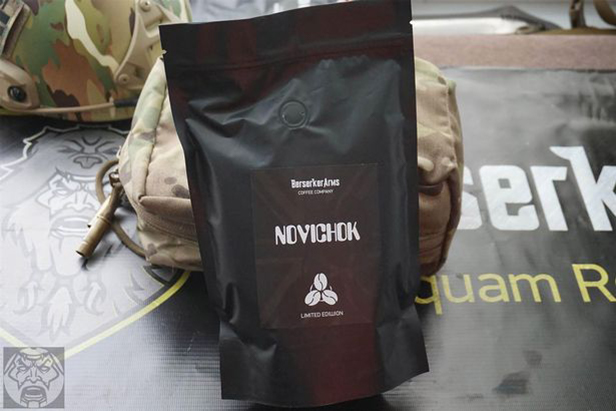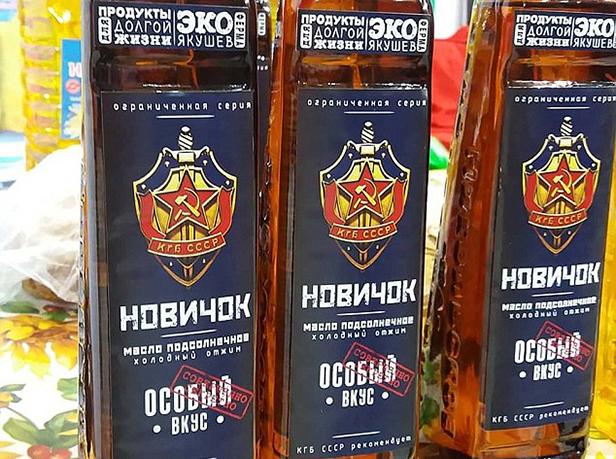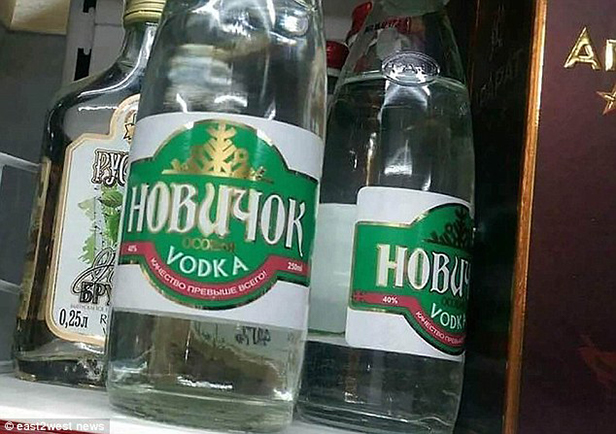Strategy July 25, 2018
Wait, What: ‘Novichok’ Is A Hot Brand in Russia
T-Shirts, craft beer, vodka, a cocktail, coffee and sunflower oil are increasingly popular products in Russia that bear the name of the deadly nerve agent.
In a Nutshell
*Novichok as a branding phenomenon appears to speak to a proud sense of Russian nationalism and defiance to perceived Western demonization of their country that some Russians find appealing.
*The products raise interesting questions on ethics and morality for marketers and brands.
It’s fair to say that Novichok deserves a place on the list of “Really Terrible Things Humans Have Created in Their Evil & Stupidity.” It is, of course, a nerve agent developed in the Soviet Union in the late 20th Century. When inhaled or ingested, Novichok rapidly attacks the body, preventing nerves from communicating with muscles and inducing vomiting, among other heinous effects that can culminate in death. Death, indeed, is exactly what Novichok brought to a British woman earlier this year. It was also the poison used to attack a former Russian spy in England. The U.K. government says the Kremlin is behind the attacks, though Moscow denies Russian involvement.
And yet, for all that, Novichok has developed a hip cachet in Russia. Makers of T-Shirts, craft beer, a cocktail, vodka, sunflower oil, and coffee have all used Novichok as a brand name of late in the world’s largest nation by land mass. It would seem – and pardon the colorful verbiage here – “Novichok” has a certain badass appeal that speaks to a proud sense of Russian nationalism and defiance to what some Russians believe is the demonizing of their nation by western media and governments.
Certainly, such sentiments come across on the Instagram page of SpareSkin, a Russian company selling Novichok T-Shirts. Promising that the tees will earn one “the love of a beautiful woman,” SpareSkin’s Instagram page features pictures of burly Russian bros sporting the Novichok shirt. See:
The criticism SpareSkin received for the Novichok branding didn’t seem to bother the apparel brand much. In fact, SpareSkin appeared to be reveling in it, posting this collage of British media headlines panning the shirts to its Instagram.
SpareSkin wasn’t the only brand tapping into the Novichok phenomenon. Alaska Brewery, based near Moscow, released a beer named after the nerve agent. In what some would call a tasteless move, the label features a grotesque surrealist painting entitled “Crawling Death.”
A Russian brewery released a beer called #Novichok in May, saying its "captivating taste will take your senses and consciousness to neuroparalytic nirvana." https://t.co/wTAVVHS7Gg pic.twitter.com/WitpU5QK17
— RFE/RL (@RFERL) July 14, 2018
Upon releasing the beer, the brewery said its "captivating taste will take your senses and consciousness to neuroparalytic nirvana." Alaska Brewery added that it was "top secret" and that "Trump won't be able to prove anything." In a discussion with media outlet RFE/FL, the brewery later said it "didn't mean anything wrong" and that "maybe it is just a kind of bad joke,” but added: “Our view on Novichok is [that the spy poisoning] is just [a] provocation from London and some kind of fake story in [the] mass media.”
Meanwhile, Coffee Novichok is a thing, too. Berserker Arms, which media reports indicate typically markets military equipment, makes the caffeinated offering. The firm’s marketing does the equivalent of raise a middle finger to the U.K. and western claims of Russian-backed poisoning on British soil, saying “Like in the U.K. it will not kill you, but you will be addicted forever,” and “Since you liked THE Novichok so much, we decided to make a Salisbury edition.” A poisoning occurred in Salisbury, England.

Novichok Coffee. Photo: Berserker Arms/east2west news.
Beyond coffee, beer, and T-Shirts, there is also Novichok sunflower oil – launched by a farmer from Central Russia. He told The New York Times he wanted to “inject an element of humor” into the discussion around Novichok. (Yup, hilarious…)

Sunflower oil named Novichok. Photo from east2west news.
Since this is Russia, there would of course be a Novichok vodka. And there is.

Written in Cyrillic, “Novichok” is the name of this vodka.
Perhaps strangely, it wasn’t only Russians looking to cash in on the Novichok name. Bristol Dry Gin in the U.K. released a 75% ABV Vodka called Novichok. The liquor maker took a ton of heat for doing so, but said reaction has been “overwhelming positive.” Bristol’s statement added that it understood “the timing of the release of this product may have lacked sensitivity."
Bristol Dry #Gin has apologised “if any offence was caused” by the release of its new 75% abv #Novichok Edition #Vodka following the Wiltshire nerve agent scandal.#IPNews #UKBusinessLunch https://t.co/4VmsyfAD65
— 🌍Bailey Walsh LLP (@BaileyWalshLLP) July 23, 2018Back in Russia, a bar in Volgograd also serves a cocktail called Novichok.
The outpouring of Novichok branding raises a lot of interesting questions for marketers. For instance: Is all fair in marketing and war as long as the branding/campaign appeals to desired audiences, or do marketers and brands have a moral responsibility to eschew initiatives that can be seen as exploitative and promoting violence, jingoism, etc.?
Stated a bit differently, is that moral responsibility merely relative, meaning marketers and brands need only to understand what’s considered right/appealing to target audiences and develop initiatives based on that, rather than to do what is objectively good? Perhaps you’ll say that all good is subjective. Okay. But from where we’re sitting, using a nerve agent’s nefarious, murderous reputation as a marketing vehicle for selling products seems juvenile at best, and degenerate and exploitative at worst – seems to further the creation of an ever more violent, polarized world. To us, that’s clearly bad for everyone – and thus objectively wrong.
